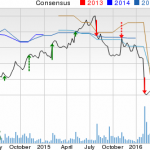from the New York Fed
The March 2017 Survey of Consumer Expectations shows a decline in both short-term and medium-term inflation expectations. Labor market expectations generally improved, with a rise in earnings growth expectations and a decline in the mean expected probability of losing one’s job.

Notably, the mean perceived probability of finding a job increased to its highest level since the series’ start in June 2013. Expectations about increases in interest rates on savings accounts and in U.S. stock prices rose sharply, reaching new series’ highs.

z sce.png
The main findings from the March 2017 Survey are:
Inflation
Median inflation expectations declined at both the one-year and the three-year ahead horizons from 3.0% in February to 2.7%. Both declines were fairly broad-based, but largest among middle-aged (between ages 40 and 60) and lower-educated (high school or less) household heads.
Median inflation uncertainty (the uncertainty expressed by respondents regarding future inflation outcomes) declined at the one-year but increased at the three-year ahead horizon.
Median home price expectations rebounded from 3.1% in February to 3.3%, remaining within the narrow 3.0-3.3% band observed since mid-2015. The increase was most pronounced for respondents with lower education (high school or less), and lower income (annual incomes of less than $50,000).
There was little change in median food, gas, rent and medical care price change expectations, with the exception of a modest decline in the median expected change in the cost of a college education from 7.4% in February to 7.1%.
The median expectation of the year-ahead gold price change increased sharply to 3.7%, a level not seen since June 2013.
Labor Market
Median one-year ahead expected earnings growth rebounded from 2.0% in February to 2.4%, matching its December and January levels. While somewhat volatile, this measure has remained within the 2.0%-2.5% range during the past two years. The rise was primarily driven by respondents with a high school degree or less, and with annual incomes less than $50,000.
The mean perceived probability of losing one’s job in the next 12 months dropped from 15.0% in February to 14.5%, its lowest reading in five months. The mean probability of leaving one’s job voluntarily in the next 12 months decreased slightly from 21.5% in February to 21.3%.
The mean perceived probability of finding a job (if one’s current job were lost) increased substantially from 56.0% in February to 59.3%, its highest level since the series’ start in June 2013. The increase was fairly broad-based.
Mean unemployment expectations (the mean probability that the U.S. unemployment rate will be higher one year from now), declined slightly from 35.8% in February to 35.5%, its lowest level in 19 months.















Leave A Comment